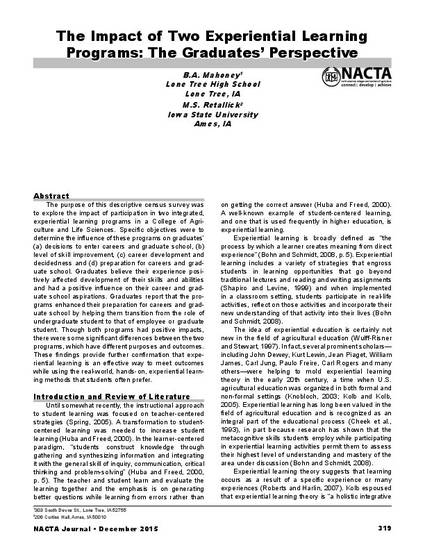
Article
The Impact of Two Experiential Learning Programs: The Graduates' Perspective
NACTA Journal
Document Type
Article
Disciplines
Publication Version
Published Version
Publication Date
1-1-2015
Abstract
The purpose of this descriptive census survey was to explore the impact of participation in two integrated, experiential learning programs in a College of Agriculture and Life Sciences. Specific objectives were to determine the influence of these programs on graduates’ (a) decisions to enter careers and graduate school, (b) level of skill improvement, (c) career development and decidedness and (d) preparation for careers and graduate school. Graduates believe their experience positively affected development of their skills and abilities and had a positive influence on their career and graduate school aspirations. Graduates report that the programs enhanced their preparation for careers and graduate school by helping them transition from the role of undergraduate student to that of employee or graduate student. Though both programs had positive impacts, there were some significant differences between the two programs, which have different purposes and outcomes. These findings provide further confirmation that experiential learning is an effective way to meet outcomes while using the real-world, hands-on, experiential learning methods that students often prefer.
Copyright Owner
North American Colleges and Teachers of Agriculture
Copyright Date
2015
Language
en
File Format
application/pdf
Citation Information
B.A. Mahoney and Michael S. Retallick. "The Impact of Two Experiential Learning Programs: The Graduates' Perspective" NACTA Journal Vol. 59 Iss. 4 (2015) p. 319 - 325 Available at: http://works.bepress.com/michael-retallick/23/

This article is from NACTA Journal 59 (2015): 319. Posted with permission.